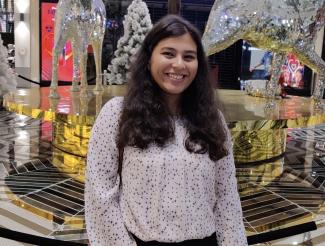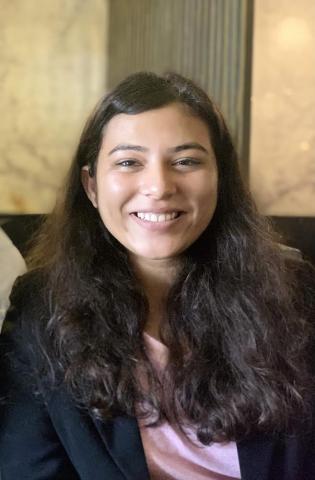
Shruti Gupta, a cochlear implant user, an employee of a MNC and an ardent techie strongly believes that a considerate and accepting community, whether virtual or non-virtual, can help in bettering the lives of a disabled individual.
Could you tell us bit about your hearing loss background? At what age was your hearing loss detected and what was the cause?
When I was one-and-a-half years old, my parents realised that I wasn’t responding to the loud firecrackers during Diwali. An immediate hearing test conducted on the following day resulted in the detection of congenital bilateral severe to profound hearing loss. The cause was thought to be a genetic disorder.
How was it coping in school with hearing loss, academically and emotionally?
My lower school journey has been very challenging, during the time I was admitted to a mainstream school - I would sometimes try to cover my hearing aids with my hair or would not wear them at all. On some days - it proved to be a total nightmare for me. People would tease me, laugh at my hearing aids and ridicule my speech. Hearing loss affects the speech and cognitive development and it can make it more challenging to learn and understand things.
Growing up, when I was in high school, I used to pretend to hear everything and hide my hearing aids before entering the class. I wanted to fit into a world where I would be accepted by people. Every time, when I try to indulge in a conversation with someone, I just go with a flow and not interrupt and do anything that calls for attention to my hearing loss. I would feel embarrassed because I couldn’t figure out how to deal with such situations. Some days living with hearing loss is extremely taunting and frustrating - emotionally draining and upsetting for me. It all started to influence my mental health.
When were you fitted with hearing aids?
Thanks to my parents, I was fitted with hearing aids immediately after the identification of my hearing loss.
At what age did you get the cochlear implant? Would you call it a life-changing surgery?
I received the cochlear implant at the age of 10 years old.
Not really, I wouldn’t call it as a life changing surgery- the cochlear implant isn’t something which gives you cent percent hearing. It does not restore normal hearing. It just helps the user recognize the words and understand the speech better.
Word of caution: It takes time and training to learn to interpret the sounds received from a cochlear implant. It could even take years for most of the people with cochlear implants to make considerable gains in understanding the speech.
But yes, on a positive note- it helped me to change my perspective towards my hearing loss and celebrating myself. I deduced much later that fighting against being hard of hearing was only fighting against my own nature. Instead, I gained freedom and confidence to express and voice out my experiences as a deaf individual.
Are you able to appreciate music and movies better now with cochlear implants? What’s your favourite?
Yes, I do love how there’re numerous genres of music and movies. I think it’s more of the beats than the lyrics which make me appreciate the beauty and the art of how music helps in soothing our stressful mind from the busy schedule. My favourite genre is Pop music and Biopic for movies.

To what extent can assistive devices and support help in full participation in education, work and leisure activities.
Well, not all assistive devices can help the targeted stakeholders in each and every sphere of their lives. For example, as I mentioned earlier- cochlear implant is a device that just augments or supplements hearing but does not restore the hearing completely. And hence we need to resort to other ways of accessing music and movies that do not come up with closed captions. Like if you go to YouTube or even podcasts on Spotify, not all the videos are embedded with subtitles and that makes it inaccessible for us because of the vast and diverse range of accents. The pronunciations are also way different from region to region. Each one of us has different ways of conversing so this is where we do feel left out when it comes to entertainment void of captions.
Because my hearing loss is an invisible disability- my teammates and colleagues never had a cue about my condition and the fact that during the pre-Covid times, things were easy for me to converse among each other as I relied on lip reading and facial expressions in addition to verbal communication. But with the current work from home scenario, it became difficult for me to get me in place because of the sudden shift from in-person to behind-the-screen meetings and discussions and hence the challenge to comprehend without lip reading, facial expressions and the developed listening anxiety and fatigue.
To me, I believe that support from a positivity-inducing community, whether virtual or non-virtual, can help in bettering the lives of a disabled individual. It is our responsibility as community members to be considerate and remain open-minded thereby helping in promoting the self-acceptance in the long run. By forming smaller sub communities to celebrate events; the motive can be entitled with understanding and betterment of the lives of the disabled individuals. It’s the way in which we ourselves grow and develop. Otherwise without community service, we would not be able to lead a strong quality of life.
You were a part of the IDC School of Design and worked on several technological aids to empower people with disabilities? What were those aids?
I actually graduated from IITB in the department of Metallurgical Engineering and Materials Science and worked at IDC School of Design as a Student Research Intern.
Being an ardent techie beyond academic boundaries during my college days, I was fascinated by the technology it offers and the connectivity with human interaction is phenomenal. Having experienced the agony of hearing loss myself, I felt the urge to work towards empowering people with disabilities. As an engineering student at my college, I have increasingly come to understand the power of technology which can serve as an aid for children who seem to be very motivated by it in this modern era.
During my first-year engineering summers on campus, when I came to know about the summer project that lies in this field of my interest, I immediately jumped at the offer. I was excited that I would get a chance to work to develop the application-based aids for children with disabilities which can holistically address the problems at the interface of healthcare and technology. Along with an interdisciplinary team,we developed a multi modal application called ‘Jellow Communicator’ www.jellow.org which aids the speech impaired to communicate. It can be used by children suffering from cerebral palsy, autism, Down's Syndrome, and brain injury. It can also be used by adults who have lost their speech following a stroke which can supplement their mode of interaction with others. Over the years, this project has earned numerous awards including the Microsoft Design Expo Award as well as the National Award from the President of India!
You are currently working at Citi as financial application analyst. Could you tell us a bit your job profile and your interaction with your colleagues?
I work in the department of Global Statements Delivery (part of Global Information Warehouse)- a strategic, state of art solution to provide machine and human readable statements generation, archival and transmission across the globe for Treasury and Trade Solutions.
I had always considered myself to be a confident yet introvert young person, comfortable in my own skin and without insecurities. That is until I realised there was this part of myself that I had been ignoring. Around few months ago, as a part of Hearing Awareness Week at office, I finally accepted that having a hearing loss was a part of who I am, a part of my identity and that I should be accepting the same by sharing my hearing loss journey and experience. It gave me a sense of liberation, pride and joy of being different from others without which I would have otherwise not felt the true version of myself.
What would you advice families who has just received an identification of hearing loss for their child?
I would first encourage the family by saying that no one can do the job that God chose the family of the deaf child to do. God picked them for a very specific purpose. The purpose of knowing that disability is neither the suffering nor the obstacle to any success rather it’s the art of building up patience and adapting to the struggles and challenges that may come by. And to teach others the power of acceptance of the human beings first, disabilities later.
If you could change one thing about the hearing loss community, what would it be?
I would wish to convert all the facemasks to transparent ones. Not only would it help the deaf and hard of hearing community, but we could also see each other’s smiles and flaunt glamorous lipstick shades.






